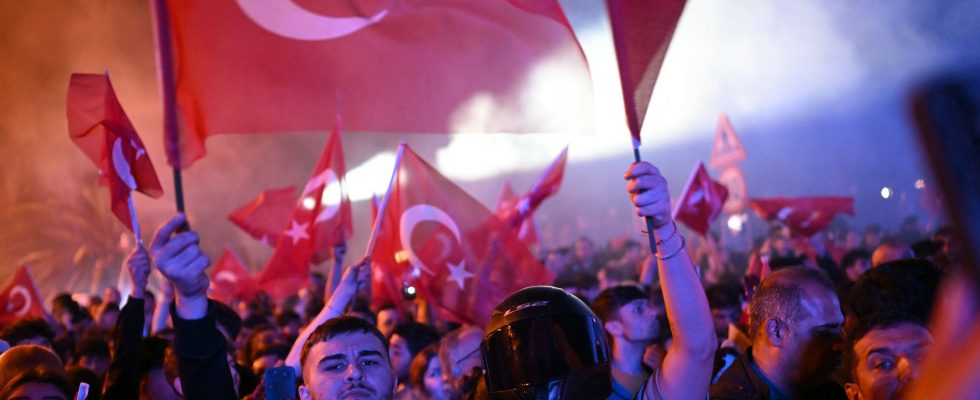This is the worst electoral debacle in two decades for the AKP. The Islamo-conservative party of Turkish President Recep Tayyip Erdogan conceded on Sunday March 31 the historic victory of the opposition in the municipal elections. “Unfortunately we did not obtain the results we wanted,” declared the head of state, who spoke at his party headquarters in Ankara.
Nearly 99% of ballot boxes nationwide have been counted. The main opposition party, the CHP (social democrat), claimed victory in Istanbul and Ankara, Turkey’s two largest cities. He also won many others, such as Bursa, a large industrial city in the northwest acquired from the AKP since 2004. The proclamation of the final results by the High Electoral Commission (YSK) expected this Monday during the day will confirm these results, already integrated by the main stakeholders, including the Head of State.
Questioned by AFP, Berk Esen, political scientist at Sabanci University in Istanbul, spoke of “the biggest electoral defeat of Erdogan’s career”, noting conversely that the CHP had recorded “its best result since the 1977 elections.
“Tonight democracy will surge”
From his party headquarters in Ankara and in front of a dejected, unusually silent crowd, the Turkish president promised to “respect the decision of the Nation”. Shortly before, the outgoing mayor of Istanbul, Ekrem Imamoglu, a media-loving and dashing fifty-year-old, announced his re-election at the head of Turkey’s largest city, which he conquered in 2019, without even waiting for the official results to be announced. “Tonight democracy will surge […] in the squares, in the streets, universities, cafes and restaurants of Istanbul”, launched the city councilor in front of tens of thousands of his supporters, exultant, rushing to the headquarters of the municipality, under a surge of Turkish red flags and smoke bombs.
In Ankara, CHP Mayor Mansur Yavas, well in the lead, had also already claimed victory, declaring in front of a cheering crowd: “Those who were ignored have sent a clear message to those who run this country.” “The voters have chosen to change the face of Turkey,” said CHP leader Ozgur Ozel.
In addition to Izmir (west), the country’s third city and stronghold of the CHP, and Antalya (south), where opposition supporters began to celebrate victory in the streets, the main opposition group achieved a spectacular breakthrough in Anatolia. She is leading the race in provincial capitals long held by the AKP, according to almost final results which took observers by surprise.
Erdogan’s strongholds resist
President Erdogan, aged 70, 21 in power, had thrown all his weight into the campaign, particularly in Istanbul, the “jewel” of the country, its economic and cultural capital of which he was mayor in the 1990s and who switched to the opposition in 2019. But the commitment of the head of state, who announced at the beginning of March that these elections were “his last”, was not enough. The AKP candidates, however, remained in the lead in several large cities in Anatolia (Konya, Kayseri, Erzurum) and the Black Sea (Rize, Trabzon), strongholds of Recep Tayyip Erdogan. Throughout the campaign, the Turkish president held daily meetings, benefiting from unlimited air time on public television, when his opponents were almost deprived of it.
The defeat of his Justice and Development Party, particularly in Istanbul, should have consequences. Recep Tayyip Erdogan conceded that the results of these elections constituted a “turning point” for his camp. Clinging to the city of Istanbul, the president canceled the 2019 municipal election, only to see Ekrem Imamoglu win with a vengeance in a second election held three months later, thus suffering his worst electoral setback since coming to power in 2003 as Prime Minister.
The mayor of Istanbul, subscribed to the podium of the Turks’ favorite political figures, has since continued to pose as a direct rival to the head of state, who nevertheless portrayed him as a devoured “part-time mayor”. by its national ambitions. For many observers, the mayor of Istanbul, who more than ever appears as the “boss” of the opposition, will, once elected, have a path towards the 2028 presidential election. Ekrem Imamoglu is in the sights of the government which had him sentenced at the end of 2022 to two years and seven months in prison for “insulting” the members of the Turkish High Electoral Committee. The councilor appealed but this sentence continues to loom as a threat to her political future and had ruled her out of the presidential race in May 2023.
In addition to a possible weariness of returning to the polls ten months after the presidential and legislative elections of May 2023, Turkish voters, faced with a serious economic crisis, sanctioned the government for these economic and social reasons: inflation of 67% on a year and the unscrewing of their currency makes the daily life of many middle-class Turks unbearable. This disaffection was notably reflected in a decline in participation compared to 2019. According to independent journalist Ariane Bonzonspecialist in Turkey, this participation rate is 76%.
